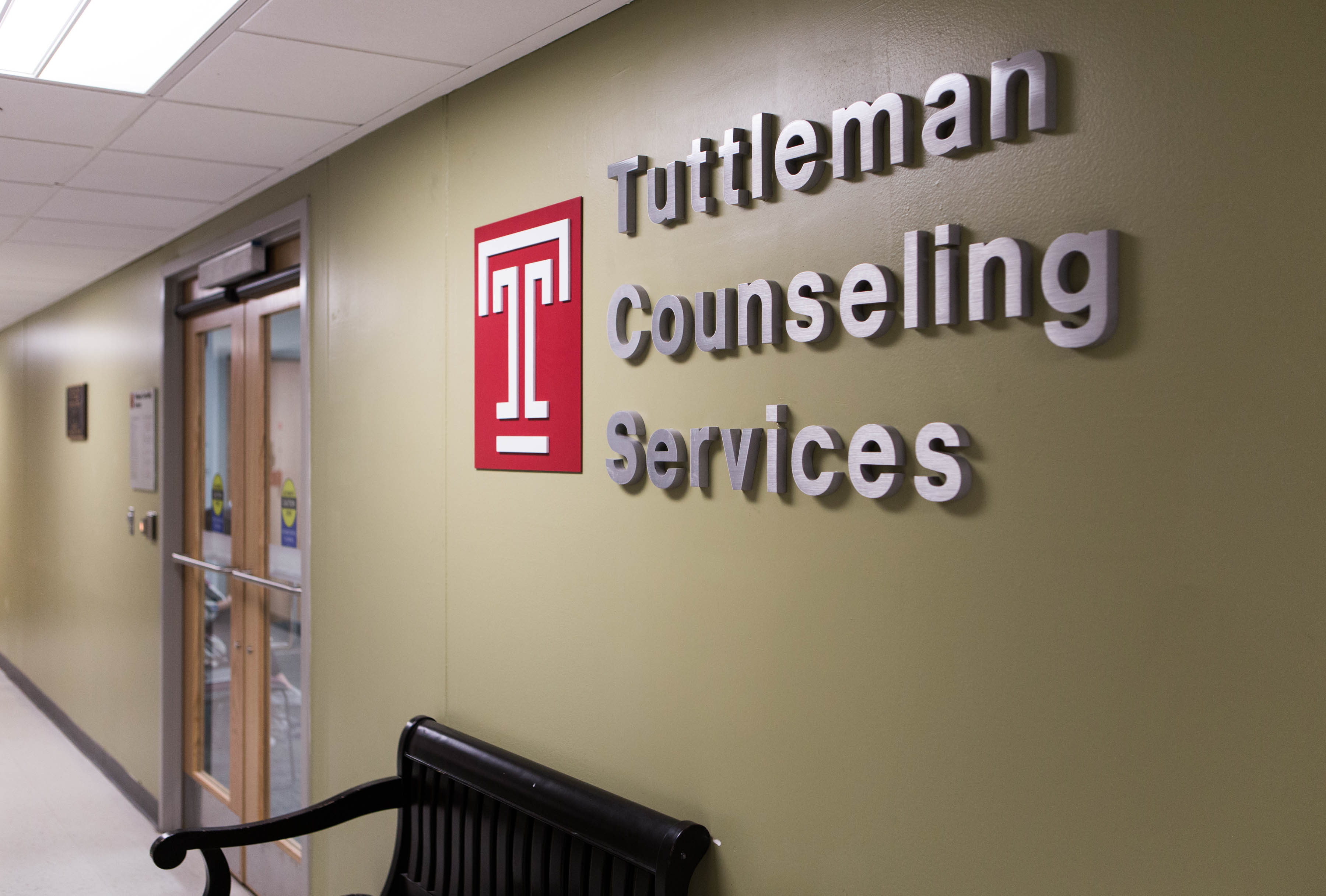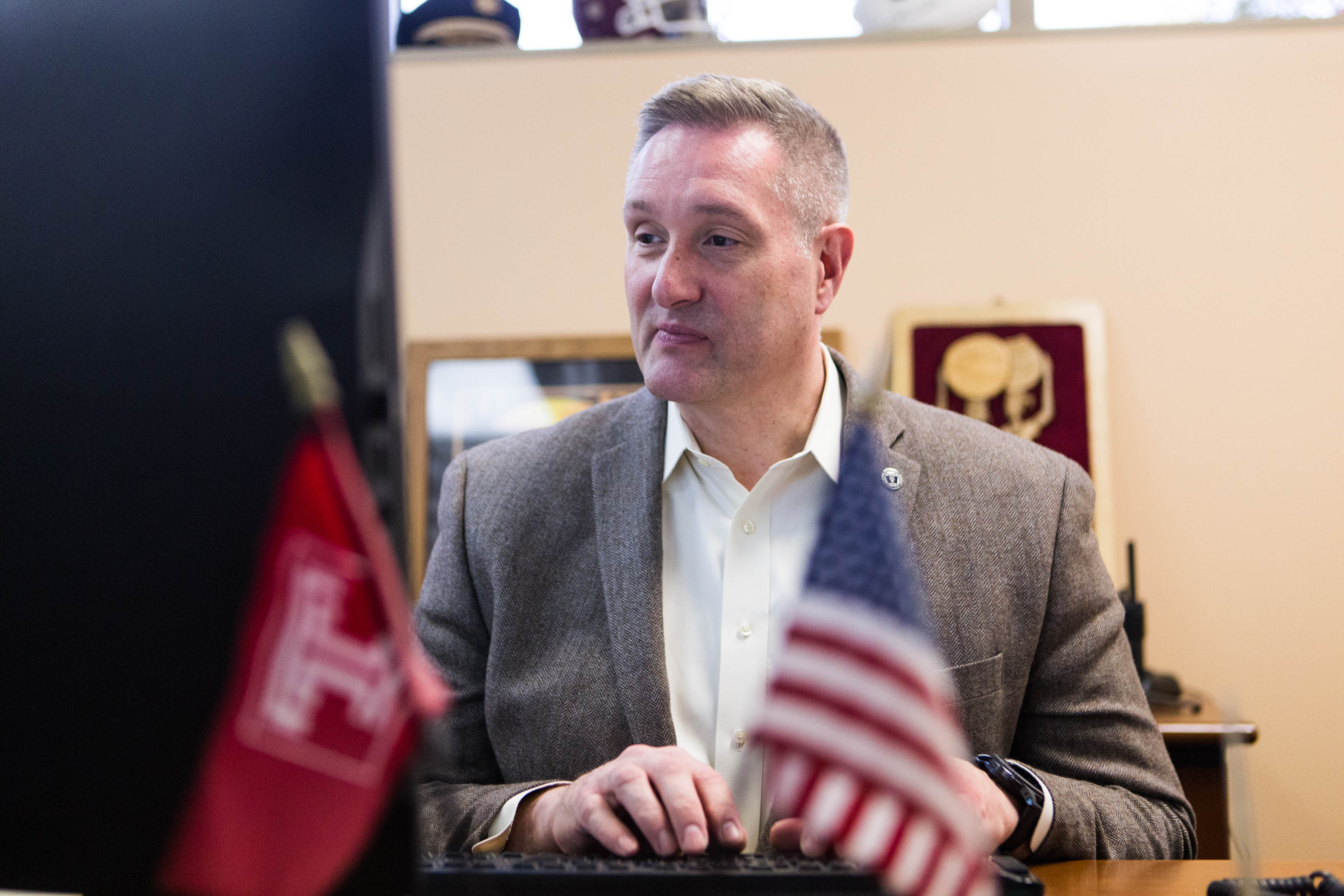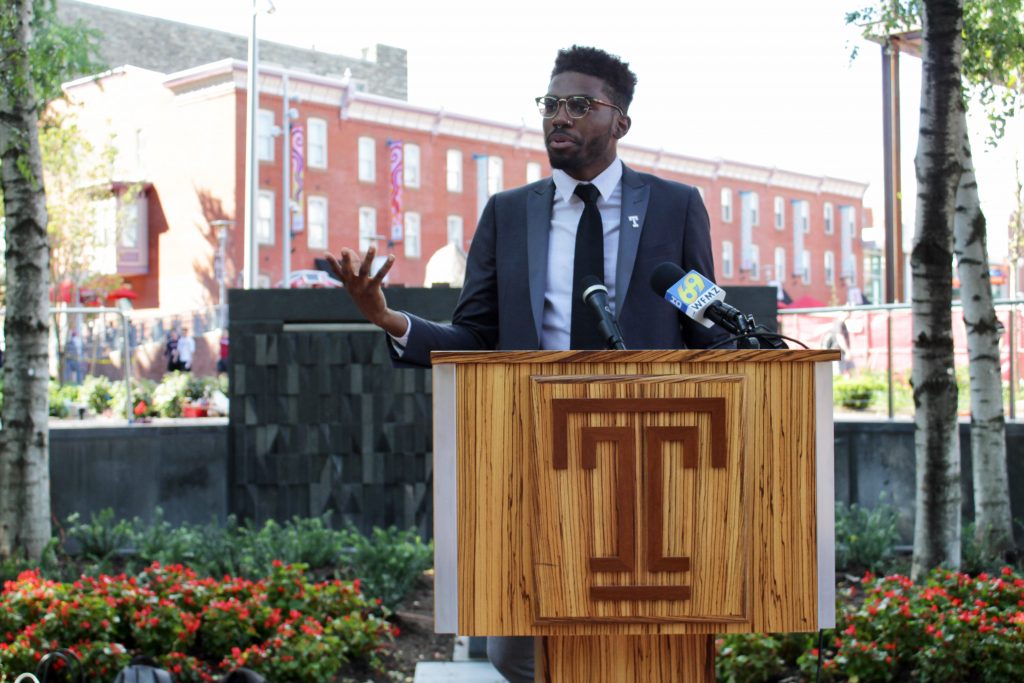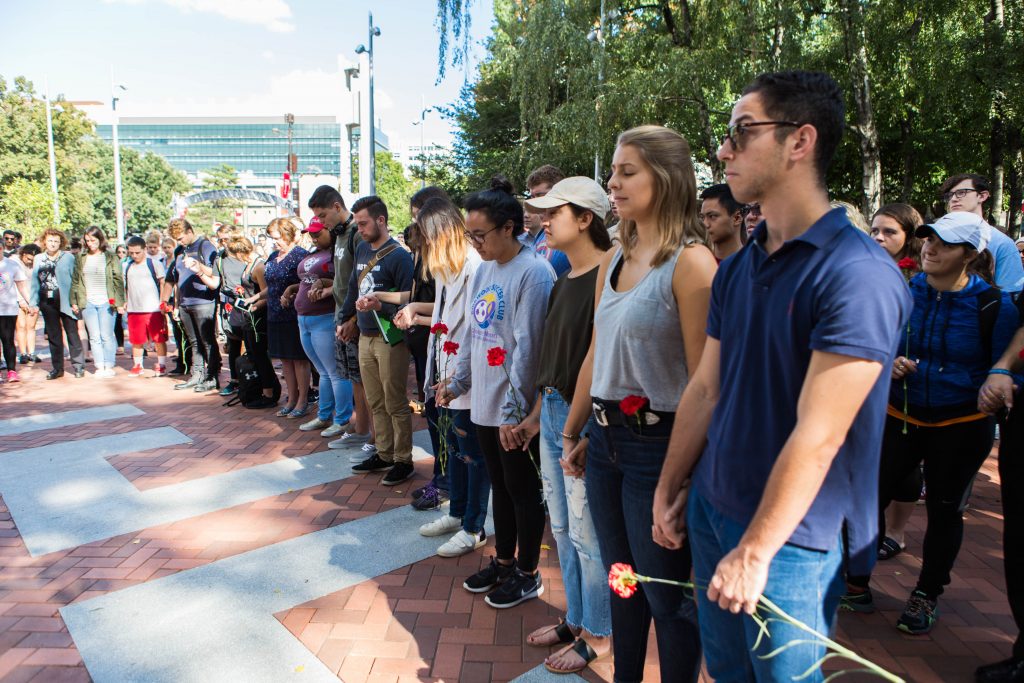Dean of Students Office
When students die, the Dean of Students office leads the university response, organizing several other staff members who provide outreach and resources to the Temple community.
Dean of Students Stephanie Ives has a protocol for addressing student death, but it is tremendously influenced by the specifics of each case: the way the student died, the student’s personality and the needs of their family and friends.
Her first responsibility is to collect information about the student who died. Ives looks into as many aspects of a student’s life as she can: academics, athletics, participation in clubs, even their social circles.
“We want to get a sense of who that student is,” Ives said. “We look at their records, but then we talk to people, getting a sense of this student’s history, their personality, their likes, their commitments in life. We get a real sense of the student as a person, because they are obviously more than their records.”
Once Ives collects all the information she can, she reaches out to everyone in the Temple community who might have had a connection to the student who died. She offers resources, like the walk-in hours for Tuttleman Counseling Services. She often emails students’ professors to excuse them from class so they can attend services and take time to grieve.
Ives also reaches out to family members to coordinate different resources they might need. Parents are faced not only with the initial shock and long-term grief, but also several administrative tasks, like coordinating with financial aid.
“I want to offer myself as a person that will answer those questions, make those connections for them, so they don’t have to think about it,” Ives said. “I want them to know I’m there when they need them and when they want those answers.”
Ives also helps organize on-campus vigils or memorials if students express interest.
“There’s always a desire to feel like, ‘How do we celebrate them? How do we feel like they’re recognized and acknowledge that they touched each person in life?’” Ives said.
If a student is particularly affected by a student’s death, Ives might recommend them to the CARE Team, led by Senior Associate Dean of Students Rachael Stark. The CARE Team, made up of several university staff members across disciplines, meets weekly to talk about students who — for multiple reasons — might be of concern. For example, if a student misses class for an extended period of time or makes alarming statements in a paper, they might be added to the CARE Team’s list.
“We can just assess the situation, check in and ensure that this student is being supported,” Stark said.

SOURCE: STATEMENTS FROM UNIVERSITY PRESIDENT RICHARD ENGLERT
DESIGN BY COURTNEY REDMON / THE TEMPLE NEWS
Sometimes, the Temple community comes together for a vigil to memorialize a student who died. Other times, President Richard Englert will send an email statement recognizing the student and offering condolences to those who knew them. Ives said there’s no specific set of rules for how the university responds to student death. Instead, the process is dictated by the “special circumstances surrounding each student’s death,” Ives said.
“Some families want to be very private about the circumstances and about the passing,” she added. “For other families, they may want to do something to memorialize their child, to leave recognition with Temple.”
“We try to take it step by step, case by case.”
Tuttleman Counseling Services
The responsibility eight full-time employees at Tuttleman Counseling Services face providing mental health treatment on a campus of more than 40,000 students is only heightened after traumatic events, like a student’s death.
After these incidents, the student body is often encouraged to access Tuttleman’s services by university statements or administrators.
Enlarge

All Tuttleman counselors are trained in an intervention method called critical incident stress management, or CISM, Tuttleman Director John DiMino said. The focal point of the strategy is a debriefing, which is a conversation led by a counselor for a group of people impacted by a traumatic event.
“The conversation is structured in such a way to get at facts first and then what people are thinking about the event or what still stays with them now,” he said. “Then, it gets into more gut-level, emotional reactions by asking questions like, ‘What’s the worst part of this for you?’ And then it gets into symptoms.”
After hearing patients’ symptoms, the counselor will “teach survival skills in the situation of a tragedy,” DiMino said. For example, if someone feels especially anxious, the counselor may ask what activities help the patient relieve stress and encourage them to take part in them regularly, he said.
He added that counselors lead debriefings with “identifiable” groups of people who are clearly impacted by a traumatic event, like professors whose student died. Debriefings are often organized after someone impacted by the incident reaches out for support.
CISM is the only training DiMino requires every Tuttleman staff member to complete when hired. He said it gives counselors the skills to handle necessary tasks that are required following traumatic events like death notifications, which is when a Tuttleman counselor tells a group of people — like a class — about a student passing away.
Students can also access individual support by visiting Tuttleman during walk-in hours for an intake appointment. A specified “counselor-on-duty” will immediately see any student “in crisis,” even if Tuttleman has reached its capacity of 35 walk-in appointments, he added.
761
students visited Tuttleman Counseling Services between Sept. 1 and Oct. 17.
66
students were asked to return another day
After moving to a bigger office space and hiring more counselors this year, wait times for Tuttleman’s services were shortened from four and a half weeks to about three weeks, The Temple News reported in October. Of the 761 students who visited Tuttleman during walk-in hours between Sept. 1 and Oct.17, 66 were asked to return another day because of overflow.
Sometimes, Tuttleman will follow up with students who express concerning symptoms, but it’s not a standard part of response to traumatic events, DiMino said.
“Everyone has different expectations of, ‘What does it mean to be in counseling?’” he added.
DiMino, who has worked at Temple for 21 years, said he thinks Tuttleman has enough resources to do its job, and the university’s outreach to the Temple community after a student passes away provides sufficient support.
“I think we do a good job,” DiMino said. “We’ve been doing the CISM stuff for many years, so we’re comfortable with it. We know it works, we’ve seen it in action.”
University Housing and Residential Life
When students die, Kevin Williams is responsible for making arrangements with family members to pick up a student’s belongings from their residence hall.
The details change with each passing student. Some families want to visit the residence hall one last time and personally pack up the belongings. Some ask Williams, the director of University Housing and Residential Life, to pack up for them. Some families forget to bring their own boxes — in those cases, Williams is prepared to lend them some.
“This is someone’s life,” Williams said. “They raised them for 18 years and they dropped them off, and now they’re picking up their belongings.”
Williams has worked at Temple for more than 10 years. In that time, he said he’s encountered “many” instances of student death. In some cases, those students died in or around their on-campus residence halls.
“It’s the worst thing that can possibly happen in the work that we do,” Williams said. “You train and prepare for this, but this is the hardest part of your job.”
For Williams, his personal response has to wait. First, he has to ensure everyone in a residence hall community has the support they need after learning one of their neighbors died.
“It’s the worst thing that can possibly happen in the work that we do. You train and prepare for this, but this is the hardest part of your job.” KEVIN WILLIAMS | DIRECTOR, UNIVERSITY HOUSING AND RESIDENTIAL LIFE
Resident assistants often host an “after-action debrief,” which Williams said is an informal, optional meeting where students can share their feelings and seek support.
Simultaneously, an RA will often refer students to resources at the university, like Tuttleman Counseling Services, the Wellness Resource Center and the Dean of Students office.
Oftentimes, RAs plan future residence hall programming around relevant topics, like stress relief or coping with loss. RAs are also responsible for following up with students who seem particularly upset by an incident.
“This is hard, hard work, and it’s even harder for these RAs,” Williams said. “These are residents on their floor, these are friends, these are people they feel responsible for.”
In some instances, residence hall communities also come together on their own to remember students.
This semester, flyers are posted in various residence halls encouraging students to donate warm clothing and food items to a homelessness charity called Jenna’s Blessing Bags — named for junior film and media arts student Jenna Burleigh, who was killed in August.
This work never gets easier for Williams, he said — but over the last decade or so, he’s tried to learn the best ways to support people when students die.
“I can remember them all,” Williams said. “You don’t forget, but you learn how to cherish those students, learn from those experiences and help parents cope as best you can.”
Enlarge

Temple Police
When students die, Temple Police is almost always involved. Charlie Leone, the executive director of Campus Safety Services, is at the helm.
As a first responder to many student deaths, Leone can’t help but think of his own children.
“You have to push through the emotions,” Leone said. “Especially when you’re there and you’re seeing things. It’s horrible. It really is.”
“It’s professional, but it’s emotional,” he added. “At some point, you have to move forward and do your job, do right by what’s happened here and keep people safe.”
In responding to student death, TUPD officers have various responsibilities. The department follows a general step-by-step process, but that changes with every student and is often complicated by specific circumstances.
HOW TUPD RESPONDS TO STUDENT DEATH
But when the process is complete, TUPD’s job isn’t necessarily done. For some officers, there is a long road ahead to deal with the emotional trauma they may have experienced by responding to a student’s death.
“In the beginning, we’re in our mode, doing what we’re supposed to do,” Leone said. “And then it starts to hit more and more, how tragic it is.”
SUDDEN STUDENT DEATHS
These are the student deaths to which Temple Police responded from 2015-2017. TUPD does not record all student deaths.
| DATE | GENDER | AGE | LOCATION | CIRCUMSTANCE |
| 1/15/15 | Female | 18 | Center City – Walnut Street | Suicide |
| 1/18/15 | Male | 20 | Off-Campus Apartment | Alcohol |
| 9/9/15 | Male | 21 | Student Residence | Illness |
| 11/13/15 | Female | 22 | Off-Campus Apartment | Suicide |
| 6/18/16 | Male | 25 | City Avenue | Illness |
| 9/27/16 | Male | 22 | Frankford Avenue | Suicide |
| 10/8/16 | Male | 20 | Off-Campus Apartment | Overdose |
| 10/23/16 | Male | 18 | Off-Campus Apartment | Overdose |
| 11/1/16 | Male | 27 | Off-Campus Apartment | Suicide |
| 11/4/16 | Male | 22 | Off-Campus Apartment | Overdose |
| 11/11/16 | Female | 23 | Lehigh Avenue | Auto Accident |
| 2/22/17 | Male | 21 | Off-Campus Apartment | Suicide |
| 4/3/17 | Female | 22 | Off-Campus Apartment | Suicide |
| 8/31/17 | Female | 22 | Off-Campus Apartment | Homicide |
| 10/8/17 | Male | 19 | Student Residence | Suicide |
| 11/27/17 | Male | 24 | Paley Library | Overdose |
| 12/2/17 | Male | 20 | Off-Campus Apartment | Overdose |
SOURCE: Temple Police
Leone does his best to help officers heal: he’s informed some officers that they can access Tuttleman Counseling Services for support, and he’s organized a few mental health debriefings for officers following tragic incidents.
“The officers, they always go back to their training and they’re professional,” Leone said. “But we always want to be aware that they’re human too, and we have to treat them as such and make sure that they have the support that they need.”
Temple Student Government
Last semester, a student who lived in the Edge on 15th Street near Cecil B. Moore Avenue died.Student Body President Tyrell Mann-Barnes was the student’s resident assistant.
“It was very difficult navigating that and getting myself the resources I needed,” Mann-Barnes said. “I wanted to use that as an example for my residents, that it’s OK to be sad, it’s OK to go through grief and it’s OK to get help and talk to someone about that.”


Student Body President Tyrell Mann-Barnes addresses the Temple community at a vigil for junior film and media arts major Jenna Burleigh on Sept. 7 in the Founder’s Garden. | MARISSA HOWE & SYDNEY SCHAEFER / FILE PHOTOS
Mann-Barnes said Temple Student Government’s main responsibility after a student dies is to encourage students to practice self-care by accessing on-campus resources like Tuttleman Counseling Services.
Mann-Barnes added TSG’s role isn’t necessarily to help students “move on” from a traumatic event after a student has died, but to process it as a community.
He said he’s “not sure” if the university could do more to support the Temple community.
But he commended the university’s response to student deaths this year, like the murder of junior film and media arts major Jenna Burleigh in August. TSG and President Richard Englert released a statement about her death, and Englert and Mann-Barnes spoke at a vigil honoring Jenna in Founder’s Garden in September.
“It’s a case-by-case basis,” Mann-Barnes said. “For the school to lay out an exact protocol of how to deal with death kind of disregards how different situations require a different type of response.”
Michaela Winberg and Grace Shallow can be reached at news@temple-news.com.
Photos by Sydney Schaefer and Marissa Howe.
Graphics by Courtney Redmon.
Produced and designed by Julie Christie.
First published Dec. 5, 2017.